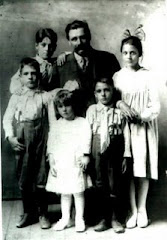In our Congregation Book study we have been studying the
book of Jeremiah with the view of applying what we learn in our own
modern day circumstances. I have learned something about the times that
Jeremiah lived in and what it must have been like. I would like to share
with you what I have learned.
Let's start 93 years before
Jeremiah began to serve as a prophet. It was a time of rivalry between
the Assyrians, Babylon and Egypt. Assyria had defeated the northern
unfaithful ten-tribe Kingdom of Israel, however Jehovah had defended
Jerusalem and it's faithful king, Hezekiah, against that Assyrian
attack. You can read about how God miraculously took down 185,000 enemy
soldiers at 2 Kings 19:32-36.
After Hezekiah's death, his son
Manasseh began to rule. He did not follow his father's righteous ways,
but rather Manasseh rebuilt the high places of false worship, that
faithful Hezekiah had destroyed. Jeremiah was probably born during the
reign of this bad king. Manasseh set up altars to the false god, Baal
and to the "army of the heavens' which worship included astrology. He
even set up altars in Jehovah's temple! Manasseh proved to be a very
wicked king, even sacrificing his own son as a burnt offering to a false
god. ..."he did on a large scale what was bad in Jehovah's eyes."
During the reign of this king Judah came under Assyrian political
control. (2 Chronicles 33:10, 11) Because of all the wickedness, God
said that what happened to Samaria and the ten-tribe kingdom of Israel,
would also happen to Jerusalem and Judah. (2 Kings 21:1-6, 12-16)
After,
Manasseh's death, his son Amon continued leading the nation in false
worship. Two years later Amon was murdered and his 8-year old son Josiah
inherited the throne.
Josiah unlike, his father and grandfather
served Jehovah faithfully and encouraged the people to leave false
worship. In his 12th year as king he destroyed the high places, the
sacred poles, and the false religious images throughout the kingdom.
Then he ordered the temple to be repaired. (2 Chronicles 34:1-8) It was
in the 13th year of Josiah's reign that Jeremiah received his
commission. King Josiah continued in his efforts to eliminate idolatry.
He even arranged for an outstanding celebration of the Passover. (2
Kings 23:4-25) Jeremiah must have been very pleased to work in this
positive atmosphere. Still, it was very difficult to move the people to
change their ways. The majority were clinging to the degraded idol
worship introduced by Manasseh. True spirituality was very low. Despite
all of Josiah's reform the Judeans proved to be like an unfaithful
wife. They left the pure worship and their God Jehovah and prostituted
themselves to foreign gods. (Jeremiah 11:1-3, 13) Jehovah's words
through the prophet Jeremiah did not change the Jews as a whole.
Meanwhile, the surrounding nations were fighting for supremacy. The
Babylonians with the Medes conquered Assyria. When Egypt came to assist
Assyria, Josiah tried to turn the Egyptian army back at Megiddo, but he
was wounded there and later died.
(2 Chronicles 35:20-24)
With
the death of King Josiah, the religious and political climate changed.
This was a time of worry and international instability. Josiah's
son, Jehoahaz became king, but in just 3 months Pharaoh Necho removed
him from the throne and took him to Egypt. Necho enthroned Jehoiakim,
another son of Josiah. Jeremiah continued his activity under this
unfavorable king. (2 Chronicles 36:1-4) Jehoiakim practiced idolatry
and did what was bad in Jehovah's eyes. (2 Kings 23:36, 37) The Judeans
viewed the temple as if it were a 'lucky charm" that would protect them.
Jehovah told Jeremiah to go to the temple and condemn the Judeans for
the wicked things they practiced: stealing, murdering, committing
adultery, lying and worshiping false gods. If the people did not heed
the warning and repent, Jehovah would forsake his temple. (Jeremiah
7:1-15, 34; 26:1-6) After you read in your Bible the words Jeremiah was
commanded to speak, imagine yourself there. What courage and conviction
it would take for Jeremiah to declare this message in public, before
prominent and influential people.
How did the religious leaders react to Jeremiah's speech? Read Jeremiah 26:8-11 for the answer.
While
many feel that Jeremiah was a prophet of doom, he also proclaimed a
message of hope. Jeremiah foretold that Jehovah would deliver a faithful
remnant of Israel from their enemies and return them to their land
where they would reside in security. Jehovah would establish a "new" and
"indefinitely lasting covenant" with his people . Jehovah would write
his law in their heart. He would forgive their errors and remember their
sins no more. Also, Jehovah promised that a descendant of David would
"execute justice and righteousness in the land." (Jeremiah 31:7-9;
32:37-41; 33:15) These prophesies would come true in the decades and
centuries to come, even a fulfillment that touches our lives and give
us hope for a bright future. (Jeremiah 31:31, 33, 34; Hebrews 8:7-9;
10:14-18)
During the end of Jehoiakim's
reign the Babylonian and Egyptians fought near the Euphrates River, 370
miles north of Jerusalem. King Nebuchadnezzar won out over Pharaoh
Necho, ending Egyptian power in this region. (Jeremiah 46:2)
Nebuchadnezzar now dominated Judah. Jehoiakim was forced to be his
servant, but after 3 years Jehoiakim rebelled (2 Kings 24:1, 2)
Nebuchadnezzar surrounded Jerusalem. Jehoiakim appears to have died in
this siege. His son Jehoiachin surrendered to the Babylonians.
Nebuchadnezzar stripped Jerusalem of its riches and took into exile
Jehoiachin, the families of the king and of the nobles of Judah, the
nation's mighty men, and its craftsmen. Among the exiles were Daniel,
Hananiah, Mishael, and Azariah. (2 Kings 24:10-16; Daniel 1:1-7)
Nebuchadnezzar
then left Zedekiah, another son of Josiah, as king of Judah. He was
to be the last earthly king of the Davidic line. Zedekiah 'continued
to do what was bad in the eyes of Jehovah." (Jeremiah 52:1, 2)
eventually Zedekiah also rebelled against Nebuchadnezzar.
Jeremiah's
enemies exerted great pressure on him to support the rebellion. (2
Chronicles 36:13; Ezekiel 17:12, 13) Jeremiah urged Zedekiah to submit
to Babylon. That was not a popular message, though it was from Jehovah.
What made it even harder to deliver was Hananiah a false prophet who
publicly proclaimed in God's name that the Judeans would be freed from
Babylonian rule. Now Judah was divided into those who favored
submission to Babylon and those who urged rebellion. Zedekiah rebelled
by seeking military assistance from Egypt. Jeremiah had to contend with
nationalistic hysteria of those supporting the rebellion. (Jeremiah
52:3; Ezekiel 17:15) Nebuchadnezzar returned with his army and besieged
Jerusalem. Jeremiah's message to Zedekiah was critical at this time.
Death awaited those who remained in the city. Those who went out to the
Babylonian Chaldeans would survive. (Jeremiah 21:8-10; 52:4) The
Judean princes struck Jeremiah and put him in the house of detention.
(Jeremiah 37:13-15) Jeremiah refused to soften Jehovah's message, so the
princes had Jeremiah put into an empty cistern where they hoped he
would perish in the mire. Ebed-melech, an Ethiopian serving in the
king's house, rescued Jeremiah. (Jeremiah 38:4-13). Then, in 607 BCE,
the Babylonians broke through the walls of Jerusalem. Nebuchadnezzar's
army burned Jehovah's temple, and completely destroyed the city,
slaughtering the nobles of Judah, chasing after those who tried to
escape and capturing them, including Zedekiah. (Jeremiah
39:1-7) Jeremiah's words from Jehovah regarding Jerusalem and the
temple all came true. But Jeremiah did not rejoice, rather God's prophet
mourned the calamity of his people. You can read how he felt in the
Bible book of Lamentations.
What became of Jeremiah? Some
Judeans escaped to Egypt, they forcibly took Jeremiah with them. Still,
Jeremiah prophesied that Nebuchadnezzar would invade even that country
and bring the Judean refugees to ruin. (Jeremiah 42:9-11; 43:1-11;
44:11-13)
So that is a little historical
background of what was going on in the nation of Judah and in the
countries around them in Jeremiah's day. I hope it will help you in
understanding the word of Jehovah, through his prophet Jeremiah. Do you
see any similarities between Jeremiah's day and our day?
Wednesday, November 28, 2012
Subscribe to:
Post Comments (Atom)



















































































No comments:
Post a Comment